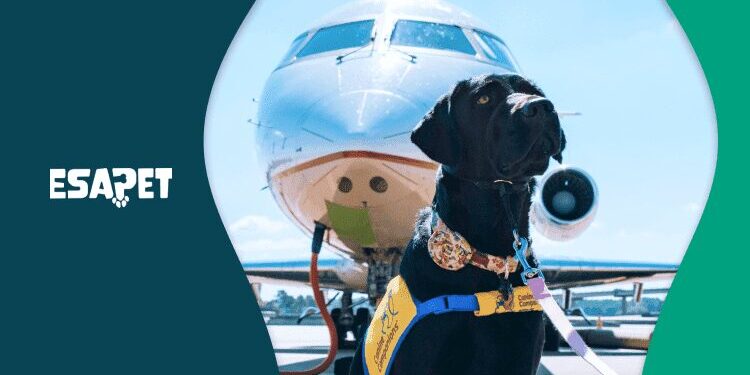Service Dog Laws: Understanding Rights and Regulations 2026

Service dog laws are essential for protecting individuals with disabilities. They ensure that service dog handlers have equal access to public spaces, housing, and air travel. Federal laws like the ADA, ACAA, and FHA provide nationwide protections for service dog handlers.
As a service dog handler, knowing your rights and staying informed is important. These laws are here to protect you and ensure your dog can go with you wherever you need to go. Take advantage of these protections, and ensure you’re prepared for any changes.
What is a Service Dog?
A service dog is an individually trained animal that assists individuals with disabilities. These dogs work or perform tasks related to their condition. A National Institutes of Health study shows that service dogs greatly improve people’s independence.
These dogs guide visually impaired people, alert them to medical conditions, and assist with mobility. Service dogs also help with mental health. They assist individuals with PTSD by sensing anxiety attacks early. They can provide deep pressure therapy during these moments.
Types of Service Animals
There are various types of service animals. Each dog is trained to perform tasks that assist with disabilities. These animals play a vital role in helping their handlers live independently. Service animals provide support in various ways depending on the handler’s needs.
- Guide Dogs
- Hearing Dogs
- Mobility Assistance Dogs
- Psychiatric Service Dogs
How a Service Animal Assists with Various Disabilities
Service dogs assist people with a range of qualifying disabilities, both physical and mental. They help their handlers gain independence by performing tasks that mitigate the person’s disability. These animals are vital in improving daily life and help regain mobility for their handlers.
| Application | Service Dogs | Therapy Dogs | ESA’s |
|---|---|---|---|
| Allowed by ADA & federal law to enter into public establishments |  |  |  |
| Allowed by law to live with their disabled handlers, even in “No Pet” environments |  |  |  |
| Custom-trained to mitigate a single persons’ visible or invisible disability* |  |  |  |
| Must have the ability to tolerate different environments & people |  |  |  |
| Primarily provides emotional support and companionship |  |  |  |
| Provides support to a wide variety of people |  |  |  |
Overview of Federal Service Dog Laws
Federal laws protect the rights of individuals with disabilities who use service dogs for assistance. The ADA ensures handlers have equal access to public spaces. The ACAA and FHA protect service dog handlers during air travel and housing situations.
The Americans with Disabilities Act (ADA) was passed in 1990. It ensures equal access to public facilities for dog handlers. It ensures equal access to public facilities for dog handlers. The law recognizes only dogs as service animals under Titles II and III.
The Air Carrier Access Act (ACAA), passed in 1986, protects service dog handlers during air travel. Airlines cannot deny boarding to service dogs. However, handlers must submit documentation about the dog’s health and behavior 48 hours before the flight.
The Fair Housing Act (FHA), passed in 1968, protects service dog handlers in housing situations. Under this act, individuals with disabilities can live with their service dogs in “no-pet” housing. Landlords cannot charge pet fees for service animals.
ADA Service Dog Rights
According to the ADA, a service animal is a dog trained to perform tasks for an individual with a disability. Service dogs must be allowed in public facilities like restaurants. These dogs can guide visually impaired individuals, assist with mobility, or alert them to medical conditions.
Air Carrier Access Act for Service Dogs
The ACAA requires specific documentation for service dogs during air travel. Handlers must submit a U.S. Department of Transportation Service Animal Air Transportation Form at least 48 hours before the flight. The form confirms the dog’s training and good health.
Handlers must also provide a DOT Service Animal Relief Attestation Form for eight-hour flights. This form ensures the dog can relieve itself without causing sanitation issues during the flight. These documents ensure both safety and accommodation during air travel.
Fair Housing Act and Service Dog Rights
The FHA gives service dog handlers the right to live with their dogs, even in housing with “no-pet” policies. Landlords cannot charge extra fees for these dogs. This federal law ensures people with disabilities have equal access to housing, regardless of pet restrictions.
Service Dog Laws by State
Service dog laws vary by state. Each state may have specific requirements beyond federal laws. The Americans with Disabilities Act (ADA) provides a national standard. However, state laws may include extra protections or obligations.
Understanding local regulations ensures that service dog handlers and businesses follow and respect these laws. We will look at specific laws in California, Arkansas, Iowa, and other states.
California, Arkansas, and Iowa
In California, the Accommodation Law (West’s Ann. Cal. Civ. Code § 54.2) allows service dogs to go in public spaces. The law also addresses penalties for harming a service dog, as detailed in West’s Ann. Cal. Penal Code § 600.2. Also, service dog fraud is considered a misdemeanor.
Arkansas has protections under A.C.A. § 20-14-304. It covers harassment with service dogs. Arkansas law prohibits misrepresenting a service dog, with fines up to $250 (A.C.A. § 20-14-310). In Iowa, the Accommodation Law (I.C.A. § 216C.11) provides similar rights for service dogs.
Florida, Texas, Oregon, and Other States
The Accommodation Law (West’s F.S.A. § 413.08) grants public access to SAs and outlines interference penalties in Florida. These include intentional harm, which is punishable as a felony. Misrepresenting a service animal required for a disability is also illegal in Florida (West’s F.S.A. § 413.08).
Under V.T.C.A. Human Resources Code § 121.003, Texas law allows SAs in all public spaces. Violating this law results in fines. Oregon law (O.R.S. 659A.143) also protects access for service dogs. It punishes interference with their duties, making it a Class A misdemeanor under O.R.S. § 167.352.
State-Specific Regulations for Service Dogs
California enforces penalties for misrepresenting a service dog. In Florida, individuals convicted of service dog fraud must complete community service. New York requires public access training. Some states may also need an ID card to prove the dog is trained to work.
How to Find Local Service Dog Laws
To find local service dog laws, visit your state government’s website or the ADA National Network. These resources offer detailed information on local regulations. Checking local laws is essential for following state guidelines and maintaining your service dog’s protections.
Upcoming Changes in Service Dog Laws
Several updates are expected that may impact handlers. One major change involves potential updates to the ACAA. It could further regulate the documentation required during air travel. Airlines might introduce stricter guidelines to confirm service dog qualifications.
Also, new guidelines under the Fair Housing Act (FHA) are being discussed. These could streamline the process for landlords to verify service dogs without imposing unnecessary burdens on tenants. These changes aim to protect both the rights of individuals and landlords.
Preparing for Changes in Service Dog Legislation
To stay informed, regularly check official government websites like the ADA, HUD, and DOT. Joining service dog advocacy groups can also help. Make sure your documentation is current. Consult with legal experts if needed to stay compliant with the new laws.
ADA Service Dog Access Rights
The ADA guarantees public access rights for service dogs. Service dogs can go anywhere the public is allowed. Schools, restaurants, and even hospitals must allow them. These dogs help their handlers navigate daily life. No business or facility can deny access to a service dog.
The ADA also sets clear rules for businesses. They cannot ask for proof or certification of the service dog. A service dog can only be removed if it directly threatens others’ safety or is out of control. This law ensures people with disabilities have equal access to all public spaces.
How to Ensure ADA Compliance for Service Dog Use
To remain ADA-compliant, businesses must allow service dogs in all public areas. They cannot charge fees or treat the handler differently. Businesses should train staff to ask whether the dog is an assistance animal required for a disability and what tasks it performs.
Psychiatric Service Dog (PSD) Laws
PSDs have unique legal protections under the ADA, FHA, and ACAA. PSDs assist people with mental health conditions like post-traumatic stress disorder (PTSD) or anxiety. PSDs, like other service dogs, can go in public spaces.
While general service dogs help with physical tasks, PSDs focus on mental health. PSDs have access rights like service dogs in public places. PSDs are covered under the FHA and ACAA, allowing them in housing and planes, while emotional support animals don’t have these rights.
PSD Access Rights and Restrictions
Under the ADA, PSDs are granted full public access rights. The law allows them to go with their handlers to places like. Unlike general assistance animals, PSDs are recognized for their task-based support. FHA and ACAA protect PSDs in housing and air travel.
Qualifying a Dog as a Psychiatric Service Dog
To qualify a dog as a PSD, it must be trained to help a person with a disability. Handlers can train the PSD themselves without professional help. However, some documentation may be needed for air travel and housing. This is to verify the dog’s behavior and training standards.
Get your Official PSD Letter Consultation from a licensed therapist.
Get PSD Letter NowService Dog Laws and Emotional Support Animal Laws
Service dogs and ESAs have different protections. Service dogs, protected under the ADA, are trained to help people with a physical or mental impairment. They have full public access rights. ESAs offer comfort but don’t need specific training. They lack the same access rights.
The Fair Housing Act (FHA) protects both service dogs and ESAs in housing. Landlords must allow ESAs an ESA letter in “no-pet” housing without charging extra fees. However, ESA laws have changed. The ACAA no longer covers ESAs, and airlines now decide their own ESA policies.
Legal Protections and Restrictions for ESAs
ESAs have fewer rights than service dogs. The FHA protects their right to live in “no-pet” housing without fees. However, under the ACAA update, airlines can charge fees and set policies for ESAs. Unlike service dogs, ESAs are no longer guaranteed free air travel.
Service Dog Laws in Restaurants and Public Places
Under the ADA, service dogs are legally allowed in public places. These include restaurants, hotels, stores, malls, theaters, and all other public spaces. Restaurant staff cannot ask for certification or charge extra fees for the service dog.
Many misunderstand the law. Some think a public place can deny access if the dog is present. This is not true unless the dog is out of control or poses a direct threat. Service dog handlers must ensure their dogs are well-behaved. Staff should know the dog’s purpose is to assist with a disability.
How to Handle Service Dog Denial in Restaurants
If denied access, handlers can calmly remind restaurant staff about the ADA. Explain that service dogs are not pets and have legal rights. If necessary, request to speak with a manager. It’s helpful to educate staff on the ADA’s guidelines.
Service Dog Laws for Landlords and Housing Providers
Landlords must allow service dogs under the Fair Housing Act (FHA). Because service dogs are not pets, landlords cannot charge pet fees or deposits. This ensures that people with disabilities can access housing without restrictions.
Landlords cannot refuse housing because of a service dog. However, the dog must be well-behaved and not cause damage. If there’s a dispute, landlords and tenants should discuss it calmly. The law prioritizes the handler’s rights but aims to protect both parties.
Documentation Requirements for Service Dog Housing Access
Landlords can request a letter from an LMHP confirming the handler’s disability and the need for the service dog. However, landlords cannot ask for proof of the dog’s training or certifications. The documentation confirms the disability, not the dog’s status.
Additional Resources for Understanding Service Dog Laws
The ADA website provides a clear guide on public access rights for service dogs. The Department of Housing and Urban Development (HUD) explains housing rights, while the U.S. Department of Transportation (DOT) offers insights on air travel with service animals.
You can also visit Assistance Dogs International (ADI) and The Humane Society for more guidance on training and rights. These organizations help handlers understand their rights.
Need assistance? Click the button below to contact ESA Pet for help understanding service dog laws, obtaining a PSD letter, and training resources.
Conclusion
Service dog laws, like the ADA and FHA, offer important protections for people with disabilities. They ensure access to public places, housing, and travel without discrimination. Knowing the rules helps you exercise your rights as a service dog handler.

Service Dog Disabilities, Service Animals
What Disabilities Qualify for a Service ...
Jonalyn Dionio
Dec 12 2025

Service Animals, ESA and Service Animal Rights, Psychiatric Service Dog
Real Service Dog Vest vs. Fake: WhatR...
Jonalyn Dionio
Dec 12 2025



